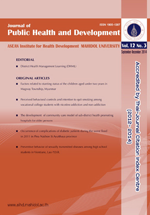Informed consent process for vulnerable populations: a multifaceted approach
Main Article Content
Abstract
When conducting the research involving human subjects, it is the responsibility of the investigator to
protect right and welfare of the research subjects. In general rule of research, every subjects must agree to
participate in writing before they can enroll in a research. Informed consent is essential for the biomedical research. It is a communication process between the researcher and the potential research subjects that starts before the research is initiated and continues throughout the study
1. In Thailand, informed consent process includes providing the informed consent form together with information sheet. Despite its importance, obtaining informed consent is often a complex process, which raise concerns about the extent to which participants are truly informed. Effective implementation is especially difficult among research participants who have limited health literacy. Usually, these potential participants are from traditionally high-risk groups, including underrepresented minorities and children. Therefore, a study by Heerman
2implemented an innovative approach that use low health-literacy communication strategies and visual aids to augment and potentially replace the traditional approach to informed consent.


